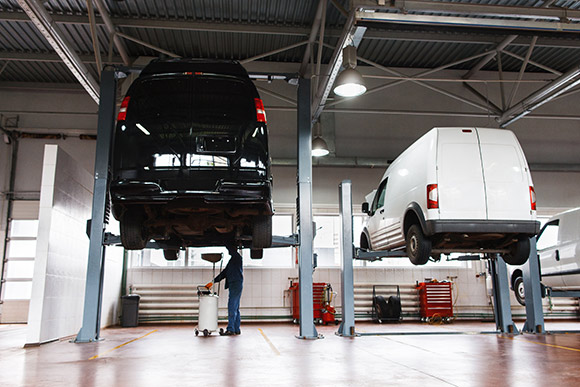How to minimise LCV downtime
16/03/2018 00:00:00by Mark McKenna16/03/2018 00:00:00How to minimise LCV downtimeBluedrop Services


When your Light Commercial Vehicles LCVs are off the road for longer the fees for replacement hire vehicles, loss of potential earnings and impact on customers rises.
The Freight of Transport Association estimates that having just one LCV van off the road can cost a business as much as £727 per day! They go on to suggest that unplanned VOR averages five or six days per vehicle per year, which is in addition to around three days’ planned downtime due to scheduled maintenance and repairs.
Acquire the correct LCV for the job
By starting with your leasing company or indeed vehicle purchase you can help to ensure that VOR time is kept to a minimum from the first instance. Ensuring you have a van of the correct size, payload and equipment included for the job in hand can have a positive effect on the unplanned VOR time.
It is really important to correctly specify your vehicle and involve both drivers and providers in the decision process. The older your vehicle, the more likely it is to break down, so calculating your vehicle replacement cycle correctly can help to reduce both maintenance costs and downtime.
Schedule regular LCV repairs
Regular servicing and repairs will help to reduce VOR time. With advanced warning of servicing via fleet management systems it is possible to provide adequate opportunity to schedule regular repairs.
Engage your drivers
By training your drivers in the usage of their new LCV before the vehicle is due to be delivered, they can begin to become familiar with the controls and equipment. It is also important to allow adequate time to handover the vehicle and discuss vehicle information, safety features, routine maintenance, equipment, and driving techniques to reduce wear and tear, incident rates and unscheduled repairs.
Ensure spare tyres are fitted
With safety in mind, ensuring your LCV vehicles all come equipped with the correct spare tyres can ensure that excessive downtime is avoided. Without access to a spare tyre a breakdown service will need to recover the vehicle to the closest tyre centre, as opposed to changing the tyre there and then prior to carrying on with day-to-day activities.
Provision of standby vehicles
In the event of unplanned downtime, it is important to have standby vehicles at the ready. How many vehicles a fleet adds to their schedule needs to be carefully calculated. Too small an LCV fleet can mean that you are left too lean when ultimately some are off the road. Equally, there is a fine balance to be struck between those vehicles that are required on a permanent basis and those that can be available at short notice on rental.
Manage your service and repair networks
By booking servicing and repair well in advance you can plan for necessary parts to be in stock and roughly how long the maintenance will take. In addition to this, by managing an approved network of providers, you can agree to certain service level agreements and timings to get your vehicles back on the road. However, if there are times when the maintenance provider is not within your current network and is last minute you may not be informed straight away once a vehicle come in or have the guarantees that they will be back on the road and earning you money within acceptable timescales.
If repair work is required as part of an insurance claim you will often find that your insurance provider will specify which service provider to use to ensure downtime is kept to a minimum and costs are managed.
Considering local garages with 24/7 capabilities will help to ensure that your fleet is serviced out of hours and off road time is kept to a minimum.
Preventative maintenance
Matt Cooke from Filter Services says: “Preventative maintenance is something that we love to talk about. It’s one of the most important parts of looking after a vehicle and helps to prolong its life. One part of a vehicle, large or small, that gets overlooked too often is the filters. Whether that's an oil filter, air filter or even cabin filter, these mostly inexpensive parts can have an effect of unexpected proportions.
“Regularly changing the filters and performing the proper preventative maintenance on your car, light commercial vehicle and even heavy commercial vehicle will allow for a smoother ride, better performance and better fuel economy. In doing this you could be saving money too, by keeping your vehicle healthy and reducing the chance of anything else going wrong.”
Return to blog menuWant to find out more about Bluedrop's Motor Fleet Insurance?
Call our friendly team now for the right insurance cover - at the best price
+441489780491
Calls recorded for training and quality.



 Privacy and Cookie Policy
Privacy and Cookie Policy